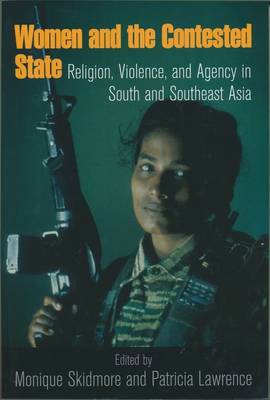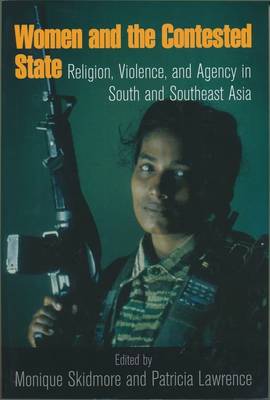
- Retrait gratuit dans votre magasin Club
- 7.000.000 titres dans notre catalogue
- Payer en toute sécurité
- Toujours un magasin près de chez vous
- Retrait gratuit dans votre magasin Club
- 7.000.0000 titres dans notre catalogue
- Payer en toute sécurité
- Toujours un magasin près de chez vous
Women and the Contested State
Religion, Violence, and Agency in South and Southeast Asia
Description
Throughout South and Southeast Asia, groups battle over definitions of identity--in direction and character--for their state, a struggle complicated by the legacy of colonialism. The contributors to this volume explore the intricate, dynamic relationships that pertain between women's agency and the state-making institutions and armed forces of Kashmir, India, Sri Lanka, Bangladesh, and Burma (Myanmar). They also address the complex roles of Islam, Hinduism, and Theravada Buddhism in these postcolonial dynamics.
In particular, the contributors examine religion as a way of understanding how women's agency is constituted, created, and constrained during times of conflict with the state and other armed actors, such as guerilla groups and paramilitaries. These essays at the intersection of gender, religion, and peace studies will be of interest to a wide range of scholars and students who study conflict and hope for peace in South and Southeast Asia.
Contributors: Monique Skidmore, Peter van der Veer, Veena Das, Betty Joseph, Yasmin Saikia, Patricia Lawrence, Alexandra Argenti-Pillen, Mangalika de Silva, Ingrid Jordt, and Bénédicte Brac de la Perrière.
Spécifications
Parties prenantes
- Editeur:
Contenu
- Nombre de pages :
- 274
- Langue:
- Anglais
- Collection :
Caractéristiques
- EAN:
- 9780268041267
- Date de parution :
- 01-10-07
- Format:
- Livre broché
- Format numérique:
- Trade paperback (VS)
- Dimensions :
- 154 mm x 230 mm
- Poids :
- 376 g

Les avis
Nous publions uniquement les avis qui respectent les conditions requises. Consultez nos conditions pour les avis.





